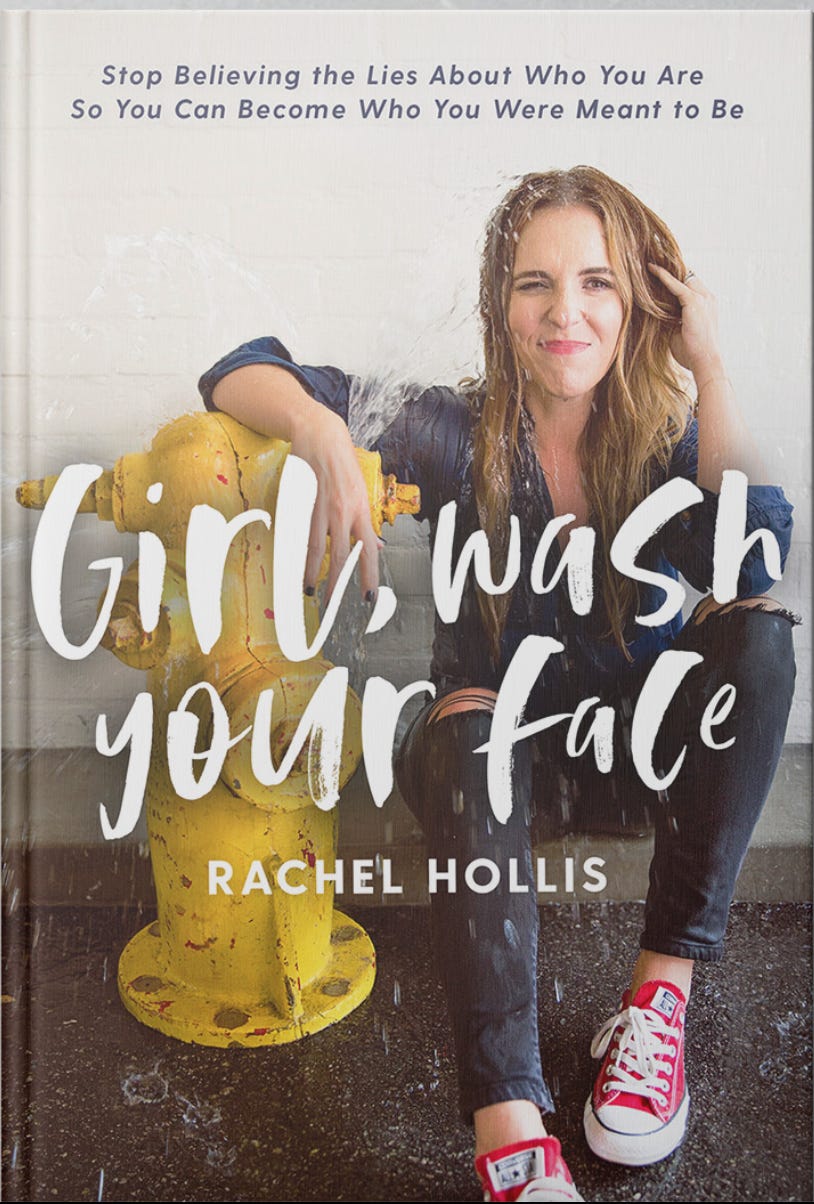Full Disclosure
As you know, reader, I am a confessed fan of the podcast Maintenance Phase. Even given the moments when their bombshells about, say, Oprah and her “wagon of fat” don’t hit me hard because I am an old who has already had this discourse, Aubrey Gordon and Michael Hobbes1 still manage to educate and entertain and be all around good hosts.
And as much as I hate to repeat myself,2 I’m gonna call out the most recent episode about Rachel Hollis3 because I had a dang epiphany while listening. I’ll circle back to said moment of clarity but first:
Rachel Hollis is the Girl, Wash Your Face girl.4 Her career is built on giving women advice that masquerades as empowerment a la Oprah or anyone who uses the phrase “girl boss.” Hollis’ market is mostly Christians who would like to be more affluent or thin or powerful or fulfilled than they currently are. Hollis built her brand by talking about her stretch marks, relatableness, and work ethic. She posts bikini selfies! She vlogs about getting up at 5 a.m. to pursue her dreams! She built a multi-million dollar business just by showing an audience who she is!
Here’s the thing, tho. None of that is truly true. It’s only true-ish.
Hollis is allergic to admitting to how much of her success comes from being a photogenic white lady whose husband has a seven-figure salary as a Disney executive. And while I don’t begrudge her those things,5 I do have a huge problem with her pushing a message of “the reason you don’t have the life I have is because you don’t work hard enough or want it badly enough.” Because that message is damaging bullshit.
It’s the same message that the founders of LuLaRoe (yes, the leggings people) push on their salesforce of mostly moms, which the new documentary LuLaRich unpacks for those who like a true story about a business falling apart6 because the owners are very bad at business.7 When the wheels started to come off of LuLaRoe, the founders (and those who had gotten in early enough to make some cash), pushed responsibility for the failures onto those at the lowest rung. You aren’t working hard enough, they’d say. You don’t want it badly enough. Get up at dawn, work until the wee hours, and build your dream. The reason this isn’t a success is you.
(Side story: when I first graduated from college and moved to Austin, I worked at a Crate and Barrel knock-off8 called One Market Place in Highland Mall. The owners stopped paying their bills a few months into my tenure (I quit after my paycheck bounced)9 and we stopped getting new inventory. Said owners were livid that we couldn’t just sell the stuff we had on hand, which hadn’t sold up until that point because no one wanted to buy it. But the fact that no one wanted to buy it was our fault. We simply didn’t work hard enough to sell it. We had hour-long meetings where the owners did nothing but yell at us about how defective we were. LuLaRoe has a similar vibe.)
The problem with this message of “if you just get up early and grind it out, you will succeed” is that it only tells half of the truth. It implies that your work is the only thing that matters. It’s important, sure, but there’s a shit-ton of other factors to that play into success.
And those are the factors that Hollis (and other similar influencers) tend to gloss over in their inspirational stories about how they pulled themselves up by their bootstraps. Molly Ivins described George W. Bush as thinking he hit a triple when he was born on third base. That’s Hollis, too.

There is absolutely nothing wrong with using your strengths to your advantage. Hollis leveraged her connections and her husband’s income to launch her brand. She was able to pay a bunch of content creators enough to build her website and image — and enough to keep them from talking about the work they did.10 I begrudge her none of this and am all about the folks who do the work behind the scenes getting paid.11
My grudge is with doing that and then pushing the idea that anyone can do it, too, if they just work hard enough. If it doesn’t happen for you, it’s because you don’t want to work hard enough, even though effort is only one factor in any success. That is disingenuous and causes real harm.
In the middle of this Maintenance Phase episode, I groused about that to the dogs, who, again, could not care less. And then the epiphany: all of the time I’ve spent beating myself up because my hard work has not led to millions of books sold is ridiculous.12 It’s not because I didn’t cultivate the right twitter following or write the perfect email to podcasters. So much of of what has happened in my writing career has very little to do with my personal work ethic and more to do with factors well outside my control.13
I say this as a person who has a lot working in her favor. I’m white. My husband’s salary supports us, mostly. I was pretty enough in my 20s to attract attention. I had a great college education and the cultural training to behave myself in rooms where things happen. All of those facts plus the work have gotten me where I am. It’s a good enough place. But it would be absolute insanity for me to insist that I got here completely under my own power — and that I have the expertise to tell you how to get here, too, if you follow me on Instagram or whatever.
I don’t have a great ending for this, by the way, other than the observation that there’s something sinister in the insistence that we are all just a heartbeat away from wealth and happiness if only we work harder. This feels like a uniquely American phenomenon and one that we should dismantle.
Do you agree? Think I’m nuts? Want me to work harder? Comment!
I somehow missed this NYT piece about them (maybe because they inexplicably put it in the Dining section?) and highly recommend it.
even though I repeat myself all the dang time because, again, old
As a fun home game, see if you can figure out the moment I said FUCK THAT out loud to no one other than the dogs. The dogs, btw, couldn’t not have cared less about my potty mouth, which is one of the reasons I love them.
well, woman, not girl, but I couldn’t resist.
honest. You do you, pretty lady.
Which implies that these owners were running a legit concern, rather than a pyramid scheme. Which, I mean. Come on.
Crate and Barrel eventually sued One Market Place for using the same fonts, design aesthetic, product lines, dress codes. (I just spent far too long googling for anything about this but the name One Market Place is too generic to find quickly. Know that I won’t stop searching, however, because I’m like that.)
someday I shall tell you about my family’s tradition of Christmas waffles, which spun out of this
I also have a sneaking suspicion this holds true for her books, both fiction and non-.
I have done this work and cashed the checks.
And I really, really do spend a lot of time thinking about this.
Which isn’t to say that I’m not going to do the work, mind, just that it isn’t all on me.




Have you heard of the 2020 book "The Tyranny of Merit" by political philosopher Michael Sandel? I love how he dismantles the pervasive American idea that anyone can earn their way to success if they try hard enough. While there were a few gaps in the book (it's from a philosophical perspective, but he can't completely escape the influences of being an Ivy-league educated man), it was satisfying to see him articulate the obvious problems with a social attitude that ultimately blames people for their own disenfranchisement.
https://www.goodreads.com/book/show/50364458-the-tyranny-of-merit
I also love Maintenance Phase— so much that I subscribe to their Patreon as well, and this episode about Rachel Hollis came with several small to middling epiphanies, the greatest of which when they share Rachel explaining that the only way she could get attention from her preoccupied and chaotic family was to be productive. Wham. That was also the case in my preoccupied and chaotic family— and I realize that’s the narrative I’ve carried into adulthood. I bet the childhood productivity=value equation is what fuels her adult belief about doing and producing and working (even if she isn’t doing the work and even if other problematic factors play in), and you’re right— it needs to stop.